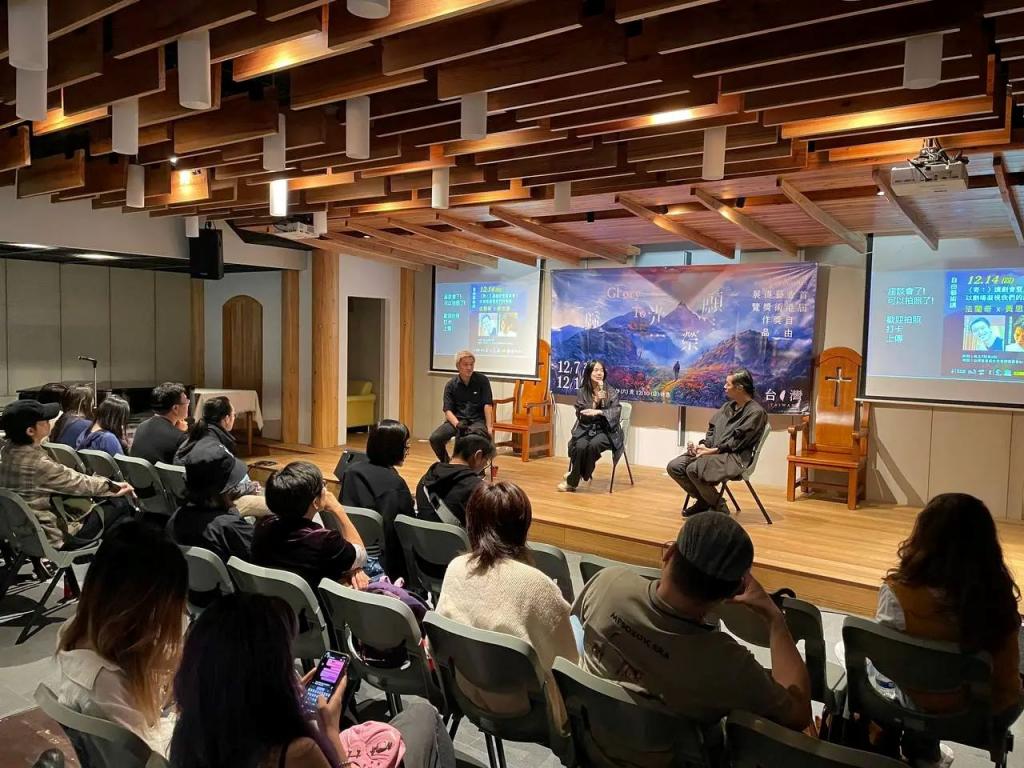FIHRM-AP第八期專文—香港自由藝術獎2023:藝術與人權倡議的跨國連結
關於作者:李伊東
李伊東,「香港民主女神」及「日本香港民主連盟」共同創辦人。出生於香港,曾在英美留學,之後在2017年於東京大學取得建築學碩士學位,並在當地從事建築設計工作。李在2019年的香港反送中運動期間創立了「香港民主女神」(Lady Liberty Hong Kong)(下稱LLHK)團隊,建立了基於香港前線示威者形象而設計而成的民主女神像,迅速成為了象徵香港民主運動的視覺符號之一。2020年在《港版國安法》通過後,李搬往日本營運LLHK團隊,並於先後在東京、台北、加拿大等地舉辦藝術展和研討會等倡議活動,繼續以藝術方式在民間社會傳播香港民主議題。2023年,李再共同創立了「日本香港民主連盟」,旨在透過議會遊說及公眾活動將香港問題帶到日本政界議題中。
關於香港民主女神與日本香港民主聯盟
「香港民主女神」與「日本香港民主聯盟」皆由民間發起的團體,前者自2019年反送終期間成立,自2024年4月1日起合併,原有成員將聯手合作擴展團隊職能,致力於各種形式活動支持香港民主運動、區域倡議及政策研究計劃,在東亞地區建立港人聲音的根基。
香港自由藝術獎2023:藝術與人權倡議的跨國連結
一、導言
香港民主女神與日本香港民主連盟的使命與願景
「香港民主女神」作為一個團隊,成立於2019年反送中運動期間,旨在透過藝術與文化的形式,捍衛和推廣香港的民主和人權。其代表作品是一座以前線抗爭者為設計藍圖的4米高雕像,象徵著香港人民對自由與民主的追求與堅持。這座雕像曾多次出現在香港的抗議活動中,成為香港民主運動的重要象徵。團隊希望透過藝術作品,傳遞香港人民的堅韌與抗爭精神,並激勵更多人關注和支持香港的民主運動。
「日本香港民主連盟」則是由一群關注香港民主運動的日本人和在日香港人組成的組織,致力於支持香港的民主運動。該聯盟透過舉辦各種形式的活動,包括展覽、講座和研討會,來提升國際社會對香港局勢的關注。他們的使命是促進日本社會對香港民主運動的理解和支持,並為在日香港人提供一個交流和互助的平台。這個組織不僅在日本國內推廣香港的人權議題,還積極參與國際人權活動,努力將香港的聲音帶到更廣泛的國際舞台。
本篇文章的主旨在於探討「香港民主女神」和「日本香港民主連盟」如何透過「香港自由藝術獎」的展覽合作,並策略性連結亞太地區(如日本和台灣)的資源,來推動人權倡議。這些合作不僅提升了香港民主運動的國際知名度,也促進了亞太地區內部的文化和人權交流。在此過程中,將深入探討這些組織的理念、面臨的挑戰以及未來的計畫。
將藝術轉化為行動
藝術在社會運動中一直扮演著重要角色,具有強大的表達力和感染力。對於「香港民主女神」和「日本香港民主連盟」來說,藝術是一種可以跨越國界、文化和語言的溝通工具。透過藝術展覽,希望喚起更多人對香港民主運動的關注,並激發國際社會對人權和自由的支持。
合作的重要性
「香港民主女神」和「日本香港民主連盟」深知,只有透過國際合作,才能在全球範圍內推動人權倡議。亞太地區的日本和台灣,不僅地理上鄰近香港,而且在文化和政治上也有著密切的聯繫。這些合作不僅有助於提升香港民主運動的國際聲量,也促進了亞太地區內部的團結和合作。
二、展覽合作的起點與目標
「香港自由藝術獎」的創立背景與目的
「香港自由藝術獎」由「香港民主女神」創立,其設立的初衷是為了捍衛和推廣香港的藝術自由與人權。這個獎項誕生於香港政治環境日益嚴峻的時期,在2020年7月後,隨著香港國安法的實施和第23條的推出,香港的藝術創作空間受到前所未有的壓力。香港一眾藝術創作者如黃國才、阿塗、及黃照達等被迫流亡海外,而決心留港的藝術家和創作者被迫面臨自我審查或冒著法律風險創作的困境,令新的藝術創作日漸減少。這種情況不僅影響了藝術家的創作自由,也導致了香港在國際舞台上的聲音減弱,逐漸失去國際社會的關注和支持。缺乏新的藝術創作,意味著香港的民意無法在國際舞台上得到充分表達,進一步削弱了國際對香港局勢的了解和同情。
為了應對這一挑戰,「香港民主女神」決定設立「香港自由藝術獎」,希望透過這一平台,支持那些勇敢發聲的藝術家,並向世界展示他們的創作。
這個獎項的主要目標是:
- 捍衛藝術創作的自由:為香港及流亡海外的藝術家提供一個無審查機制的平台,使他們能夠自由地表達自己的思想和觀點。
- 推廣香港的文化與精神:透過藝術展覽和文化活動,向全球觀眾展示香港的獨特文化和人民的堅韌精神。
- 提升國際關注:利用國際展覽和媒體報導,重新吸引國際社會對香港民主運動的關注,並鼓勵全球範圍內的支持。
2023年12月7日「香港自由藝術獎」開幕記者會合影,由左至右分別為香港邊城青年秘書長馮詔天、國際特赦組織台灣分會秘書長邱伊翎、香港藝術家黃國才、台灣立法委員林昶佐、日本香港民主聯盟發言人及前香港區域議員葉錦龍、濟南教會黃春生牧師、香港自由藝術獎策展人李伊東、日本香港民主聯盟理事潘嘉偉。
香港藝術家法蘭奇接受媒體採訪。
三、策略性連結亞太資源
為了實現這些目標,「香港自由藝術獎」積極尋求與亞太地區的合作,特別是日本和台灣。這些地區在文化交流和人權倡議方面具有豐富的資源和經驗,能夠為「香港自由藝術獎」提供有力的支持。
合作模式
- 展覽合作:與日本和台灣的當地畫廊、藝術中心和學術機構合作,共同策劃和舉辦藝術展覽。例如在2023年12月,該獎項執行團隊與台北的濟南教會合作,成功舉辦了為期十日的「香港自由藝術獎」展覽,展示得獎香港藝術家的作品,吸引了逾千位入場人次和8家媒體關注。而在2024年6月下旬,該獎項執行團隊將會與北海道大學合作,於札幌市中心舉辦「香港自由藝術獎」的日本首站展覽。
- 文化交流:於展覽期間,在會場透過舉辦講座、工作坊和交流活動,促進香港藝術家與日本和台灣的藝術家、學者和民眾之間的交流與互動。這些活動不僅增進了彼此的了解和支持,還為藝術家們提供了展示和發展的平台。
- 資源共享:與當地的人權組織和非政府組織合作,共享資金、技術和人力資源,確保展覽和活動的順利進行和持續發展。
與日本及台灣的合作具有重要的戰略意義。地理上,日本和台灣與香港相近,這使得在亞太地區內部進行交流和合作變得更加便捷。文化上,這些地區在價值觀和社會理念上與香港有相似之處,特別是在對自由、人權和民主的重視上,這為合作奠定了堅實的基礎。這種地理和文化上的連結,使得香港的藝術作品和人權聲音能夠更容易地在這些地區獲得共鳴和支持。
「香港自由藝術獎」於2023年12月在台北展出,香港藝術家黃國才向台灣立委林昶佐介紹作品。
「香港自由藝術獎」於2023年12月在台北展出,香港藝術家黃國才向台灣立委林昶佐介紹作品。
四、遇到的挑戰與阻礙
在與日本和台灣合作推動「香港自由藝術獎」的過程中,其實面臨了多重挑戰和阻礙。這些挑戰既來自於外部的政治環境,也來自於內部的資源限制和營運困難。
首先,政治壓力是一個顯著的挑戰。在台北,有超過三家知名畫廊拒絕承辦展覽,原因是害怕受到中國當局的報復。這些畫廊與中國的藝術買家有著持續的業務往來,其員工也需要經常前往中國,因此他們擔心支持「香港自由藝術獎」會引發政治上的麻煩,影響業務和個人安全。這種擔憂反映了當前政治環境對藝術創作和展示的巨大影響,也揭示了中國當局對香港藝術家和支持者的壓制手段。
其次,資金不足是目前面臨的另一大挑戰。藝術展覽普遍缺乏資金支持,不得不自行籌措資金來支持展覽的舉辦。籌款過程既耗時又困難,特別是在沒有穩定贊助來源的情況下,需要依靠個人捐款和小規模的募款活動來填補資金缺口。這種資金上的困難限制了展覽的規模和頻率,也對營運能力提出了嚴峻的考驗。
面對這些挑戰,執行團隊採取了一系列策略來克服困難並確保活動的順利進行。針對政治壓力,積極尋找那些對支持香港民主運動持開放態度的藝術機構和合作夥伴,並透過多方合作,共享資源和訊息,減少單一機構面臨的風險。
在資金籌措方面,除了開展了多種募款活動,包括線上籌款、義賣藝術品和舉辦慈善晚宴等,努力吸引更多社會各界的支持之,也積極尋求國際人權組織和藝術基金會的資助,透過多樣化的資金來源來確保展覽和活動的持續性。
儘管面臨重重困難,「香港自由藝術獎」的展覽仍然取得了顯著的成果。成功吸引了大量觀眾和媒體的關注,提高了香港民主運動的國際知名度,並促進了亞太地區內部的團結和合作。未來,執行團隊將繼續努力,克服各種挑戰,為推動香港的自由和人權運動貢獻力量。
五、未來計畫與展望
在未來,「香港自由藝術獎」將繼續發展和擴展且計劃每年或每兩年定期舉辦這一獎項,以保持對香港民主和人權運動的持續關注和支持。同時把展覽擴展到更多的國際都市,包括倫敦和紐約,藉此接觸新的觀眾群體,並擴大國際網絡。
倫敦和紐約是全球藝術和文化的重要中心,擁有豐富的資源和廣泛的影響力。透過在這些城市舉辦展覽,不僅能夠提高「香港自由藝術獎」的國際知名度,還能夠吸引更多國際社會對香港民主運動的關注和支持。這將有助於擴大國際支持網絡,並為香港藝術家提供更廣闊的展示平台。
此外,香港自由藝術獎將加強在台灣和日本的現有合作網絡,深化與當地畫廊、大學和非政府組織的合作關係。在台灣和日本,除了持續舉辦展覽、講座和工作坊,促進文化和人權議題的交流與探討,亦希望透過這些活動,激發更多人對香港局勢的關注,並促進亞太地區內部的團結和支持。
透過藝術創作和文化交流,啟發和培養一種基於賦權和創意的新型倡導渠道,是香港自由藝術獎的核心策略,畢竟藝術具有強大的表達力和感染力,能夠跨越國界和文化,將人們聯繫在一起。但從理念角度來說,由衷期待香港自由藝術獎成為展示香港人民堅韌和創新精神,並為全球人權運動注入新活力的平台。



